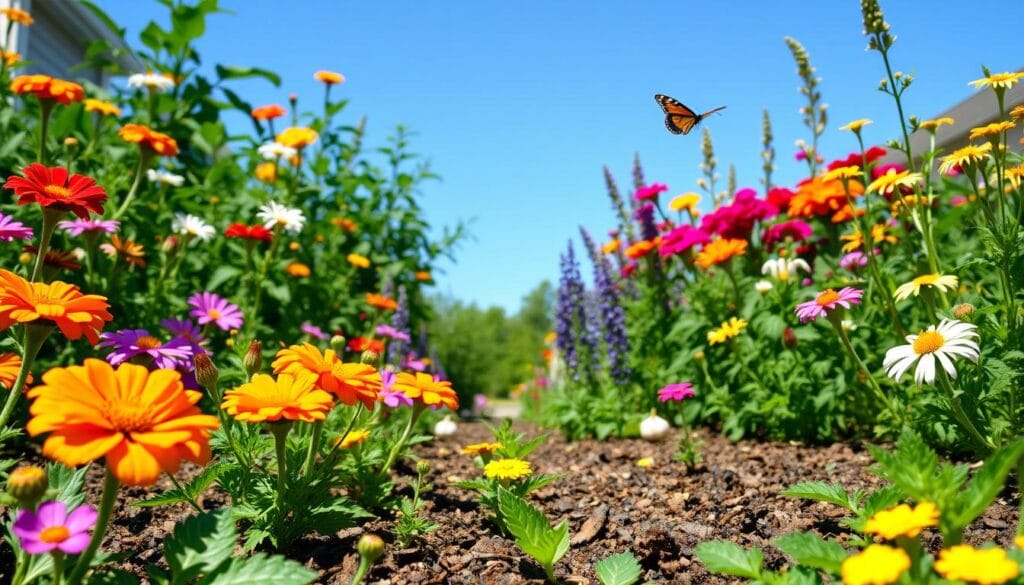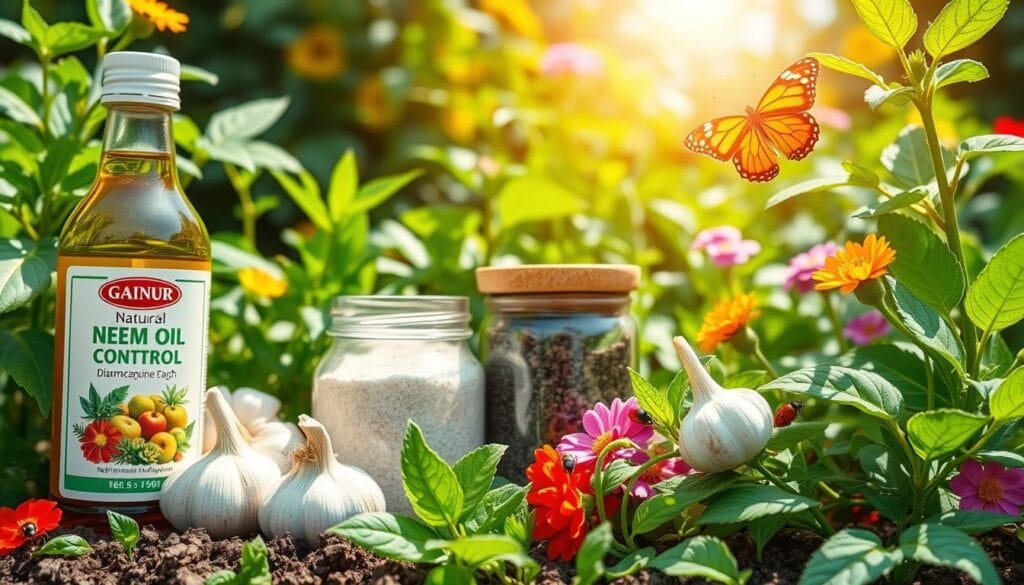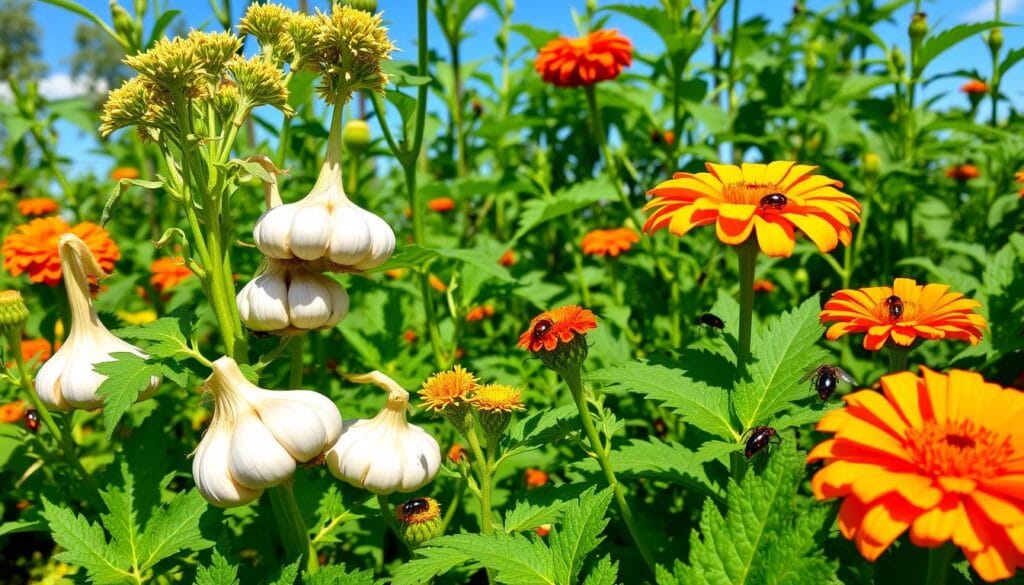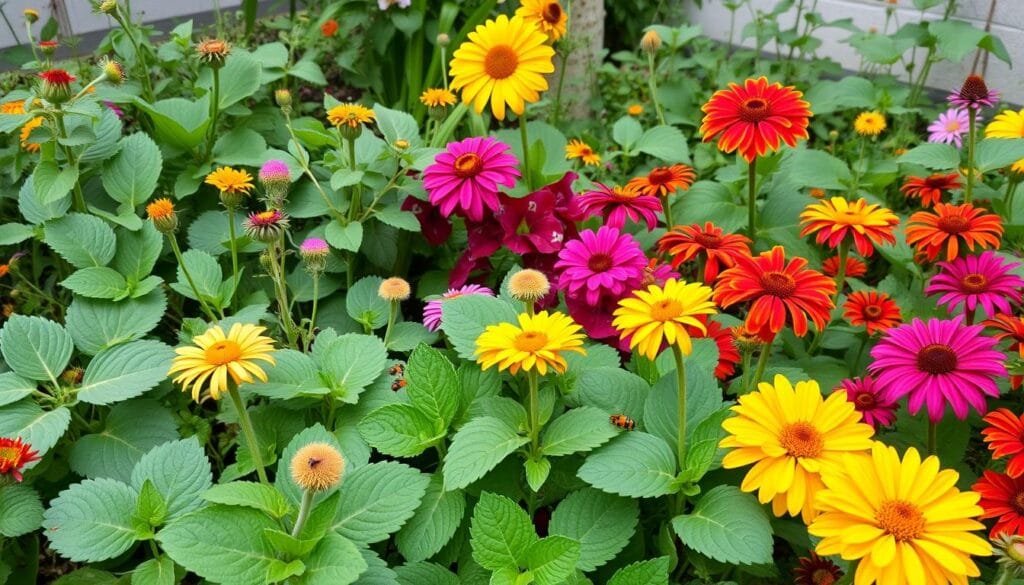When you enter your garden, you want it to be safe for your family and pets. Pesticide-free gardening helps keep your garden healthy and sustainable. Natural pest control options, such as neem oil and diatomaceous earth, are safe and effective.
Pesticide-free gardening means creating a balanced garden where plants and beneficial insects live together. To keep pests away, you can use garlic and chili pepper sprays. This approach is good for the environment and your health. It allows you to enjoy a vibrant garden without harming yourself.
Key Takeaways
- Pesticide-free gardening is a natural and effective way to control pests without harming the environment.
- Neem oil and diatomaceous earth are effective natural alternatives to traditional pesticides for organic pest control.
- Garlic and chili pepper sprays can be natural insect repellents in non-toxic gardening.
- Companion planting can help repel pests and create a balanced ecosystem.
- Pesticide-free gardening is beneficial for your health and the environment, making it a great choice for sustainable gardening practices.
- Organic pest control methods can be used to create a thriving and healthy garden ecosystem.
What is Pesticide-Free Gardening?
Pesticide-free gardening means not using chemical pesticides. Instead, it uses natural ways to keep pests away and keep the garden healthy. This method is also called eco-friendly gardening or sustainable gardening practices. It helps gardeners reduce harm to the environment and grow a healthier garden.
Understanding the Concept
This gardening style believes a garden can be healthy without chemical pesticides. It uses natural methods like introducing helpful insects or using barriers to stop pests. It aims to create a balance where plants and animals live together well.
The Benefits of Going Pesticide-Free
There are many good things about pesticide-free gardening. It’s better for the environment and makes the garden healthier. Using natural pesticides and eco-friendly methods lowers the chance of poisoning. Some key benefits include:
- Reduced environmental impact
- Healthier garden ecosystem
- Reduced risk of pesticide poisoning
- Increased biodiversity
Choosing pesticide-free gardening makes your garden more sustainable and eco-friendly. It’s good for the planet and makes your garden a better place for plants and animals.
| Benefits of Pesticide-Free Gardening | Description |
|---|---|
| Reduced Environmental Impact | Decreases the amount of chemical pesticides released into the environment |
| Healthier Garden Ecosystem | Creates a balanced ecosystem where plants and animals coexist in harmony |
| Reduced Risk of Pesticide Poisoning | Decreases the risk of pesticide poisoning for gardeners and their families |
Common Pests in Your Garden
Creating a Chemical-Free Garden means knowing about common pests. These pests can harm your plants. Using Environmentally Safe Gardening and Herbal Pest Repellents helps keep your garden safe.
Aphids, whiteflies, and spider mites are common pests. They can damage plants, causing curled leaves and stunted growth. Herbal Pest Repellents like garlic or chili pepper sprays can help keep these pests away.
Identifying Garden Pests
First, you need to spot pests. Use a magnifying glass or handheld lens to check your plants. Look for holes in leaves, white powdery patches, or actual pests.
The Impact of Pests on Plants
Pests can harm plant health and growth. They can damage leaves, spread diseases, and slow down plant growth. Use Environmentally Safe Gardening to fight pests.

Herbal Pest Repellents and safe gardening practices create a balanced garden. This approach manages pests, boosts biodiversity, and improves soil health. Your garden will thrive as a Chemical-Free Garden.
| Pest | Damage | Control Method |
|---|---|---|
| Aphids | Curled or distorted leaves | Herbal Pest Repellents, such as garlic spray |
| Whiteflies | Yellowing or stunted leaves | Yellow sticky traps, insecticidal soap |
| Spider mites | White powdery patches, fine webbing | Herbal Pest Repellents, such as neem oil |
Natural Alternatives to Traditional Pesticides
Exploring Organic Pest Control reveals many safe and effective options. Non-toxic gardening is better for the planet and your health. Natural pesticides, like neem oil and diatomaceous earth, are popular choices.
Here are some Natural Pesticides you can use:
- Neem oil controls pests like aphids and whiteflies.
- Diatomaceous earth, made from fossilized algae, dehydrates and kills insects.
- Insecticidal soap is a mild, non-toxic option for soft-bodied insects.
When using these Natural Pesticides, follow the instructions closely. This helps avoid harming good bugs and the environment. Choosing Organic Pest Control makes your garden healthier and more sustainable.

Companion Planting Techniques
Companion planting is a traditional gardening method. It helps reduce the need for harmful chemicals. This makes it a great choice for Sustainable Gardening Practices. By pairing plants, you create a balanced garden that fights pests and diseases.
This approach naturally keeps pests away, like hornworms and aphids. Plants like marigolds and nasturtiums repel many insects. Others, like basil and rosemary, keep away carrot flies and bean beetles.
Here are some benefits of companion planting:
- Reduces the need for pesticides and herbicides
- Repels pests and attracts beneficial insects
- Improves soil health and fertility
- Increases garden biodiversity and productivity
By using companion planting, you can make your garden healthy and diverse. It’s perfect for those who want to garden without harming the environment. This way, you can help the planet while enjoying a beautiful garden.
Attracting Beneficial Insects
As you work towards Environmentally Safe Gardening, attracting beneficial insects is key. These include pollinators, ladybugs, and lacewings. They help keep your garden healthy. By drawing these insects, you support plant growth and cut down on chemical use. Instead, use Natural Pesticides and Herbal Pest Repellents.
Some insects, like ladybugs and lacewings, eat common pests. For instance, one lacewing larva can eat up to 200 aphids in a week. To draw these helpers, plant flowers and herbs that offer nectar and shelter. Good choices include dill, parsley, marigolds, nasturtiums, alliums, and yarrow.
Pollinators and Their Role
Pollinators, like bees and butterflies, are vital for many plants. They move pollen, helping plants make seeds and fruit. By planting various flowers, you attract pollinators. This supports their role in a healthy ecosystem.

Ladybugs and Lacewings: Nature’s Helpers
Ladybugs and lacewings are great for gardeners. They eat aphids, whiteflies, and other pests. By welcoming these insects, you lessen chemical use and balance your garden’s ecosystem. Other helpers include parasitoids, like certain wasps or flies, which control bug outbreaks.
To attract beneficial insects, try these tips:
- Plant a variety of flowers and herbs that provide nectar and shelter
- Avoid using chemical pesticides, which can harm or repel beneficial insects
- Provide a source of water, such as a shallow dish or birdbath
- Create a welcoming environment by avoiding tidy gardens and leaving some areas wild
Homemade Pest Control Solutions
Creating a Chemical-Free Garden is simpler than you might think. Using Organic Pest Control methods is a great way to do this. Non-toxic gardening is good for the planet and keeps your family safe. Homemade pest control solutions help keep your garden healthy and green without costing a lot.
Some effective DIY recipes for natural sprays include:
- Tomato leaf spray: Soak 2 cups of chopped tomato leaves in 2 cups of water overnight, then strain and add 2 more cups of water.
- Garlic oil spray: Mix 3-4 cloves of garlic with 2 teaspoons of mineral oil, then strain and add to 1 pint of water with 1 teaspoon of dish soap.
- Hot pepper spray: Combine 2 tablespoons of hot pepper sauce with a few drops of dish soap and 1 quart of water.
These homemade pest control solutions are not only effective but also promote Non-Toxic Gardening practices. By choosing Organic Pest Control methods, you are contributing to a healthier environment and a Chemical-Free Garden. Remember, a little creativity and some natural ingredients can go a long way in maintaining your garden’s health and sustainability.

Soil Health and Pest Resistance
Healthy soil is the heart of a thriving garden. It’s key to fighting pests. By using Sustainable Gardening Practices, you can grow strong plants and cut down on pesticides. Eco-friendly gardening, like composting and mulching, boosts soil health and fights pests.
In Pesticide-Free Gardening, soil health keeps the garden balanced. Natural pest control methods help avoid harming the soil’s life. Ways to naturally improve soil include:
- Adding organic matter like compost or manure
- Using cover crops to add nutrients
- Rotating crops to break pest cycles
Follow these tips and adopt Sustainable Gardening Practices. You’ll have a garden that fights pests and diseases well. Healthy soil is the secret to a lush garden. By focusing on soil health, you’ll get a great harvest and protect the environment.
Implementing Integrated Pest Management (IPM)
As you work towards a balanced garden, using Integrated Pest Management (IPM) is key. IPM mixes Organic Pest Control, Non-Toxic Gardening, and Natural Pesticides to fight pests. This way, you can cut down on chemical use and keep your garden healthy.
IPM’s main ideas are prevention, watching for pests, and knowing when to act. Start plants from seeds, keep new plants isolated, and keep the soil healthy. Watch for pests often to catch problems early. Decide when to take action based on pest numbers.
Some good IPM tactics are:
- Mechanical controls, like removing pests or using barriers
- Biological pest control, which adds natural predators or pathogens
- Cultural controls, changing the garden to make it less pest-friendly
IPM helps make your garden a better place, less prone to pests. Always choose Non-Toxic Gardening and Natural Pesticides for a safe, green gardening space.
Seasonal Strategies for Pest Prevention
Creating a Chemical-Free Garden means thinking about the seasons. Each season brings challenges for keeping your garden safe from pests. By using seasonal strategies, you can avoid chemical pesticides and keep your garden healthy.
In spring, get your garden ready for growth. Remove old debris, prune plants, and use Herbal Pest Repellents. Neem oil, garlic spray, and hot pepper spray are great options.
Gardening Tips for Spring
To keep pests away in spring, follow these tips:
- Check your plants often for pests or diseases
- Use fine mesh netting to keep flying insects away
- Apply Herbal Pest Repellents to keep pests off and plants healthy
Fall Preparations for a Pest-Free Winter
In the fall, prepare your garden for winter. Clean up debris, remove weeds, and add mulch. This helps prevent pests from staying in your garden over winter.
By using these seasonal pest prevention strategies, you can have a thriving garden. It will be free from harmful chemicals and pollutants. Always choose Environmentally Safe Gardening and use Herbal Pest Repellents for a balanced garden.
Maintaining a Healthy Garden Ecosystem
To keep your garden healthy, it’s key to use Sustainable Gardening Practices. These practices help keep your garden full of life and balance. By choosing Eco-Friendly Gardening, you make your garden strong against pests and diseases. A big part of Pesticide-Free Gardening is fighting pests in natural ways, like introducing helpful bugs or using neem oil.
Here are some ways to keep your garden in top shape:
- Plant a variety of crops to boost biodiversity
- Use compost and organic stuff to make the soil better
- Rotate crops to fight off soil diseases
- Save water with smart irrigation systems
By following these tips and sticking to Sustainable Gardening Practices, you’ll have a garden that’s good for you and the planet. Always pick Eco-Friendly Gardening methods and steer clear of synthetic chemicals. They’re bad for the environment and your health. With Pesticide-Free Gardening, your garden will flourish and be kind to the earth.
Conclusion: Embracing Pesticide-Free Gardening
Starting your pesticide-free gardening journey is exciting. It’s a step towards a sustainable future. By using natural pesticides, herbal pest repellents, and other environmentally safe gardening methods, you help your garden grow strong and healthy. You also support a bigger goal: making our world more sustainable.
Invite your friends and neighbors to join you in pesticide-free gardening. Share your journey, successes, and what you’ve learned. Together, we can grow a community that cares for our planet and nature’s balance.
Every action you take toward natural pest control and organic gardening counts. By showing others the way, you help create a greener future. We can achieve this, garden by garden.
FAQ
What is pesticide-free gardening?
Pesticide-free gardening means taking care of your garden without harmful chemicals. It uses natural methods to keep pests away and maintain a healthy garden.
What are the benefits of going pesticide-free?
Going pesticide-free helps the environment and supports biodiversity. It also keeps your garden safe for your family and pets while maintaining balance and health.
What are the common pests found in gardens?
Common pests include aphids, spider mites, whiteflies, slugs, and caterpillars. These pests can harm your plants if not controlled effectively.
What are some natural alternatives to traditional pesticides?
Natural alternatives include organic insecticidal soaps, neem oil, and diatomaceous earth. These methods are environmentally safe and effective against pests.
How can companion planting help with pest control?
Companion planting pairs plants to control pests naturally. Certain plants attract beneficial insects that help keep pests under control.
How can I attract beneficial insects to my garden?
Attract beneficial insects by planting diverse plants and creating habitats. Pollinators, ladybugs, and lacewings can naturally control pests.
What are some homemade pest control solutions I can try?
Homemade pest control solutions use natural ingredients like DIY sprays and essential oils, which are safe and effective at repelling pests.
How does soil health impact pest resistance?
Healthy soil improves plant vigor and reduces pest vulnerability. Enhancing soil health is essential for a pest-resistant garden.
What is Integrated Pest Management (IPM) and how can it benefit my pesticide-free garden?
IPM is a holistic approach to pest control that minimizes chemical use, making it ideal for pesticide-free gardening.
What seasonal strategies can I implement to prevent pests?
Seasonal strategies include spring planting schedules and fall cleanups to prevent pests and keep your garden healthy year-round.
Source Links
- 8 Natural & Homemade Insecticides: Save Your Garden Without Killing the Earth
- 4 Ways to Grow Produce Without Using Pesticides | Earth.Org
- Bug Off! 5 Homemade Pesticides: DIY Soap Sprays for Plants
- Organic Vs. Chemical Gardening – Dr Earth
- Organic Gardening | Eldredge Lumber & Hardware
- Organic Garden: Steps for Growing Chemical-Free Produce
- 7 Ways To Get Rid of Garden Pests without Pesticides
- 10 Common Garden Pests and How to Prevent and Control Them
- How We Keep Pests Out of the Garden (Naturally!)
- Organic Pest Control for the Garden
- Gardening Without Pesticides: You Have Options!
- 15 Natural Pest-Control Strategies for Your Yard and Garden
- Companion Gardening Guide: Companion Planting for Garden Pest Control
- Companion Planting: Nature’s Free Organic Pest Control
- Discover the magic of hidden companion planting tricks
- Planting for Helpful Predators: How “Natural Enemies” Can Control Garden Pests for You
- 5 Pollinator-Friendly Ways You Can Manage Garden Pests | U.S. Fish & Wildlife Service
- 8 Beneficial Insects You Should Welcome into Your Garden
- Natural Bug Repellent for Plants: 15 Organic Sprays That Actually Work
- Natural Pest Control: 5 DIY Solutions for Your Greenhouse Garden
- 19 Non-Toxic Natural Pest Control Solutions You Can DIY at Home • Everyday Cheapskate
- The Ability to Resist Pests and Diseases – Dr Earth
- Organic Garden: Steps for Growing Chemical-Free Produce
- Pass on the Pesticides and Boost Biodiversity at Home – Wild Ones: Native Plants, Natural Landscapes
- Ultimate Guide to Organic Integrated Pest Management: Strategies for a Healthier Garden – Growing Spaces Greenhouses
- Integrated Pest Management for the Garden
- Eco-Friendly Pest Management For Your Home and Garden — Plant Harmony
- Pest Control Blog – The Ultimate Guide to Pest Proofing Your Garden – 4 Seasons Pest Control Ltd
- Organic Garden: Steps for Growing Chemical-Free Produce
- Eco-Gardening Essentials: 10 Sustainable Practices for Your Home Garden – HomeBiogas
- Protect Your Garden with Eco-Friendly Integrated Pest Management (IPM)
- Natural Methods for Pest Control
- Repurposing Garden Waste: Creative Ways to Reuse and Recycle










